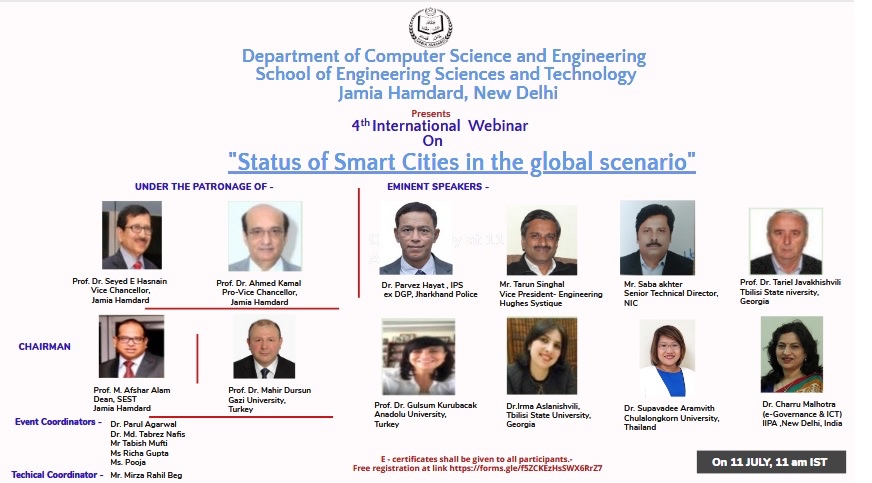Jamia Hamdard organised an International Webinar on STATUS OF SMART CITIES IN THE GLOBAL SCENARIO amidst the Coronavirus outbreak
New Delhi: Jamia Hamdard organised an International Webinar on STATUS OF SMART CITIES IN THE GLOBAL SCENARIO amidst the Coronavirus outbreak following the norms of social-distancing. The webinar provide a platform for interactions among the extremely renowned & esteemed Doctors, Directors, Professors, AI experts from the world’s reputed Universities & research institutions towards the break through scientific discoveries & solutions for the need of the hour.
The event was held under the patronage of Hon’ble Vice Chancellor Professor Dr. Seyed Ehtesham Hasnain, Hon’ble Pro-Vice Chancellor Dr. Ahmed Kamal. Our eminent Chairman of the event was none other than Hon’ble Dean, Professor M. Afshar Alam.
Esteemed personalities mainly Dr. Parvez Hayat, IPS, Ex-DGP, Jharkhand Police, Mr. Tarun Singhal, VP-Engineering, Hughes Systique , Mr. Saba Akhtar, Senior Technical Director, NIC , , Prof. (Dr.) Gulsun Kurubacak, Anadolu University, Turkey, Dr. Supavadee Aramwith, Chulalongkorn University, Thailand Dr. Charru Malhotra, E-government & ICT, IIPA, New Delhi, India participated as invited speakers and gave an insightful lecture on the current prevailing situation.
The coordinators of the event were Dr. Parul Agarwal, Dr. Tabrez Nafees, Mr. Tabish Mufti, Ms. Richa Gupta and Ms. Pooja Gupta.
There were around 400 participants from all over India & abroad which includes participants from Morocco, Kuwait, Thailand, Saudi Arabia, UAE, Bahrain, Pakistan, and Philippines. A few alumnus and participations from IIM, IIT, BHU, AMU, JNU, were also witnessed.
The webinar was commenced by Dr. Parul Agarwal (event coordinator) by providing an extended warm welcome where she gave an introduction of Smart Cities and how it can be of great help in the current scenario.
Dean, SEST, Jamia Hamdard Professor, M. Afshar Alam discussed about Smart city by highlighting urban area which uses different means of electronic Internet of things sensors to collect data and then use insights gained from that data to manage assets, resources and services efficiently, in return using data to better improve the operations across the city.
(Dr.) Parvez Hayat, (IPS, Ex-DGP, Jharkhand Police)
Dr. Parvez Hayat talked about the design and infrastructural requirements of smart cities. He referred to the first model smart city, the Barcelona model from 90s and also stressed on the use of Machine learning and Artificial intelligence which is being used in modern smart cities to solve problems like water leakage, food management and e-waste management. The uses of ICT, IoT, 5G network etc., are some common features of smart cities. Disaster detection, monitoring and threat detectors are integrated inbuilt technologies of the citizen centric approach of smart city cultures.
Mr. Tarun Singhal, VP-Engineering, Hughes Systique
Mr. Tarun Singhal, discussed the exponential growth in IoT devices within the last 20 years to a whopping 30 million due to the smart cities development. IoT is used in solutions catering to waste management, water management, energy management and mobility tracking systems. He talked about some major components of smart cities as the use of digital platforms like multi-cloud system, Traffic congestion management and smart lighting solutions and smart parking solutions. He highlighted the fact that application of IoT in traffic management can reduce approx. 26% of travel time. Mr. Singhal also discussed times series modelling based on ARIMA model, a model which helps in finding the shortest path.
Mr. Saba Akhtar, Senior Technical Director, NIC.
Mr.Saba Akhtar’s address dealt with smart education environments and eco-systems which constitutes online trainings and learning. These smart educational eco-systems function around central portal management and personalization, smart business process management and research and innovation. He also threw some light on smart educational solutions which features enhanced and interactive learning experience, access to online resources etc. These smart solutions have resulted in a generation of smart learners who have comprehensive abilities and seek the available technological support from personalized expertise and knowledge.
(Dr.) Prof. (Dr.) Gulsun Kurubacak, Anadolu University, Turkey
Prof. Dr. Gulsun Kurubacak, is an Associate Professor at Anadolu University, Turkey. She deals with communication problems with critical pedagogy and helps in improving learner critical thinking skills through project based online learning. In today’s webinar she presented her ideas on becoming smart citizens before having smart cities. She emphasized on importance on online education and certification, collaborating on research network and partnerships in this era of COVID-19. To have a concrete foundation for smart cities, it is important to have a change in technological infrastructure, have dynamic and interactive government structure and a lifelong learning attitude. To have smart cities, it is important to implement sustainable goals as suggested by her.
(Dr.) Prof. (Dr.) Supavadee Aramwith, Chulalongkorn University, Thailand
She talked about Sustainable Development Scenario for Smart Cities in the Transhumanist Era. Goals and Various stages of smart city development and numerous examples were cited of smart cities where she gave a well-illustrated presentation.
(Dr.) Charru Malhotra, E-government & ICT, IIPA, New Delhi ,India
Dr. Charru Malhotra, Associate Professor, E-gov & ICT, at Indian Institute of Public Administration, New Delhi, India talked about Government’s smart city program, Using ICTs for delivery of smart services like smart governance, smart security system etc, and also shared views on why it is vital to adopt a citizen-centric approach. Talked about the ways and methodology to be adopted for smart city development talked about the affordable aspect of smart city.

